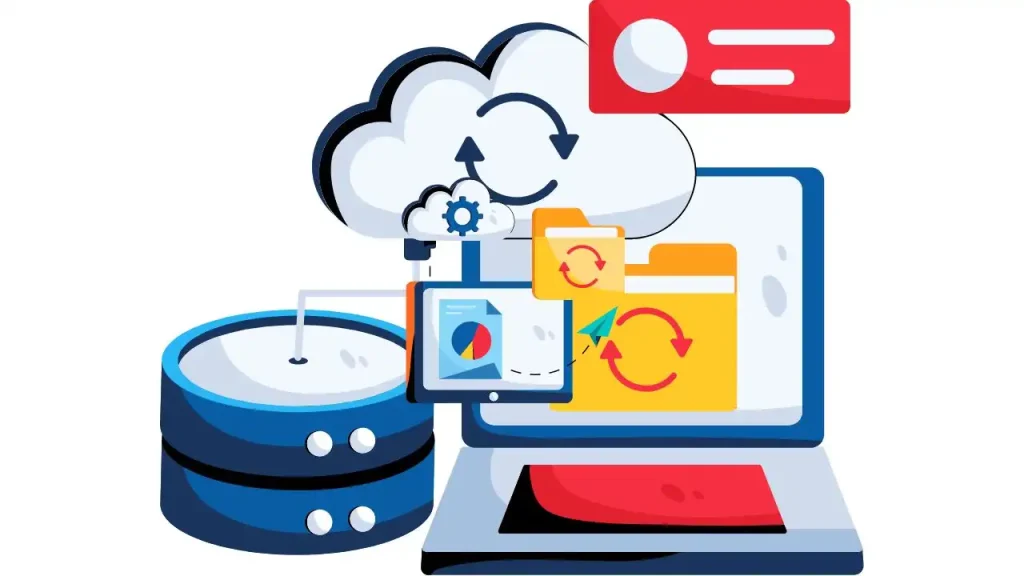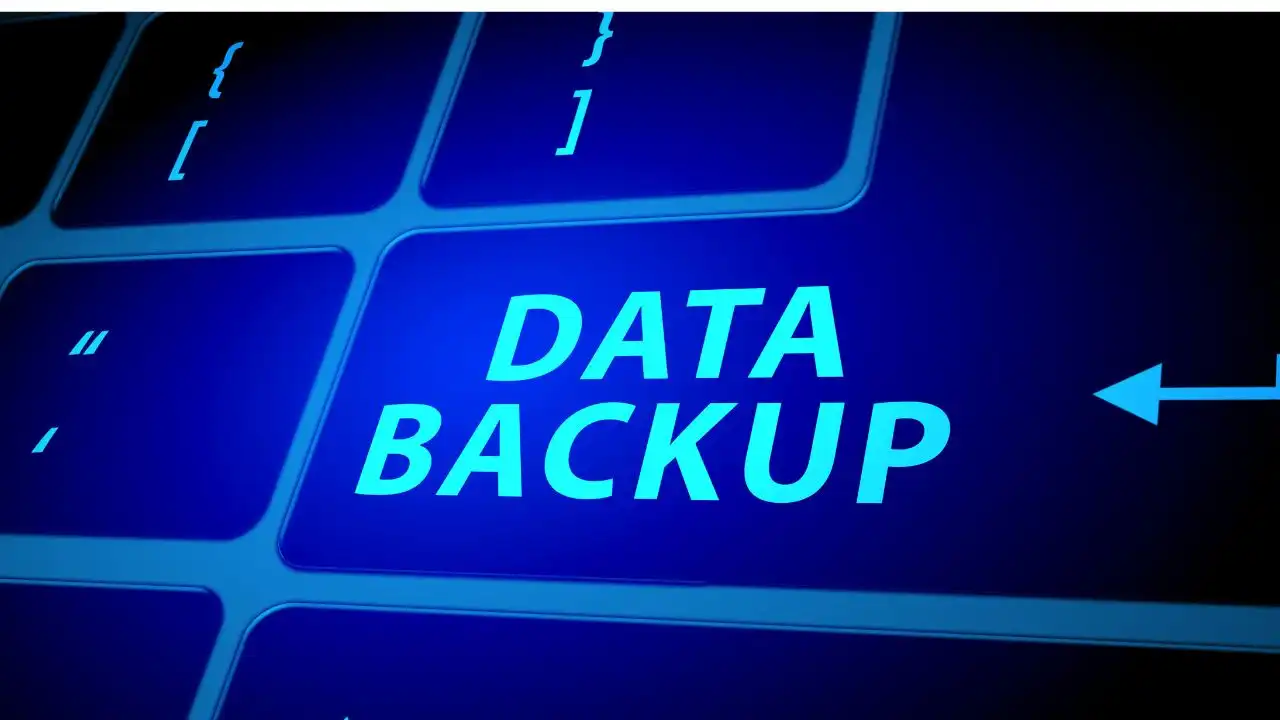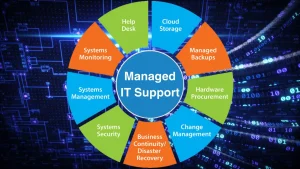As I have worked in the managed IT sector for many years, I know how important organization data is. You can never imagine compromising on losing your business data.
Backup data is not only a safe practice but also a necessity. In the field of Managed IT, data recovery and backup services can help your business stay safe. These effective practices can help save important information.
The loss of data can have very negative effects on the operations and reputation of the company. This article focuses on the top 10 data backup best practices to secure businesses.
Importance of Data Backup

Can you think about losing your valued customer record after scaling your business with many years of effort? It’s even not possible to imagine. That’s why data backup is important for businesses.
Cyber attacks, human errors, and hardware failure are the most common threats that pose a risk to important business information. Data recovery and backup protect your data from such disasters.
When your data is not backed up properly, then it is very difficult to recover it. This may cost a lot of money and time. According to statistics, almost 40% of businesses are shut down within a year due to not securing their customer data to scale up business.
Benefits of Secure Backup
- Reduced Downtime: It helps restore and backup data storage quickly and reduces downtime
- Cost Efficiency: It saves money by preventing data loss and recovery efforts.
- Regulatory Compliance: it fulfills the IT industry standards and data protection policies. Data Security: Backup solutions offer encryption and protection from cyber threats, ensuring that your sensitive business data remains secure.
- Business Continuity: A solid backup plan ensures that your business can continue to operate smoothly even in the event of a data breach, hardware failure, or natural disaster.
- Improved Productivity: Automated backups reduce the manual effort required by your staff. It allows them to focus on core business tasks without worrying about data management.
- Scalability: As your business grows, backup and recovery solutions can easily scale to meet increasing data storage needs, ensuring consistent protection for all your data.
Types of Data Backup Solutions
Businesses reach out and ask me, which type of data backup method they should choose to secure data. Every method has different pros and cons.
Let me elaborate, how many types of backup solutions there are. There are different type for data backup and restore methods.
Local Backups
Local backup helps save data on external devices like hard drives and local servers.
- Advantage: Quick access and control.
- Disadvantage: at risk of physical damage or theft.
Cloud Data Storage
Data is stored in a remote server that can be accessed through the internet.
- Advantage: can be accessed from anywhere
- Disadvantage: Requires internet connectivity
Hybrid Solutions
The data is backed up using local storage and cloud storage for additional security.
- Advantage: Offers immediate access and offsite storage.
- Disadvantage: Can become difficult to manage and may cause higher costs.
Top 10 Data Backup Best Practices

Often we hear, One size does not fit all. So every business belongs to a different niche, and every business needs a different type of backup strategy and solution.
To secure your business’s information, it is important to have a proper backup and recovery plan. Here are 10 effective data backup practices that can help you keep your data safe.
1. Implement a Regular Backup Schedule
Ask yourself, How often should you back up your data? The most important step in data backup strategy is utilizing a regular backup schedule.
Preferably, data should be backed up daily or more than once daily. This depends on the volume and importance of data.
2. Use Multiple Backup Strategy
Most of the time, you see that backup system crash. That’s why, always remember that a single backup method for important data is always risky.
Try combining local, offsite and cloud data backup storage methods for additional protection. Multiple backup solutions help you keep your data secure and easily recoverable in case of a disaster.
3. Test Your Backup and Recovery Plans
Sometimes the best backup and recovery plans fail and result in loss of data. Regularly check the data backup and recovery plans so that there are fewer chances of a failure.
According to a survey, the success rate of backups is only 57%, while the successful data restoration rate is 61%. So businesses should test their backup and recovery solutions to increase success rates.
4. Use Cloud Data Storage Services
Cloud data storage helps you store data offsite. This is a very beneficial way to store important data. This reduces the risk of losing data due to disasters.
There are additional measures that come with cloud storage. These include data encryption and automated backup options. These solutions can greatly improve data protection.
5. Keep Backup Software Up-to-Date
Outdated software can pose a risk to your data and important information. You need to make sure that your backup software is up to date.
These updates include advanced security patches and performance improvements. Important software updates protect against new threats and maintain backup integrity.
6. Encrypt Your Backups
Company’s important data should always have an additional layer of security protection. This extra security can be given by encrypting your backups.
This ensures that your data is safe and confidential. This security measure helps keep the data safe even when an unauthorized person tries to access your data.
7. Automate Your Backup Processes
Human error can sometimes disrupt the manual backup of data. By automating the data backup process, the risk of human mistakes is reduced. You can set a schedule for automated backups at regular intervals.
If you want to automate it, TTR Technology is here for you. We will automatically back up daily or weekly according to the set schedule. This reduces the chance of data loss due to missed backup.
8. Maintain Backup Redundancy
For effective recovery of sensitive data, you should always have multiple copies of your data. Sometimes data files go missing or backup fails.
To avoid this situation, make multiple copies of your data and store them in different locations so that it remains safe.
9. Prioritize Sensitive Data
You need to prioritize important data. Files containing the most important information should be on the first priority to be protected.
So that in case of a major backup failure, the most important information does not get corrupted or lost. This ensures that your major business operations will keep running even if the other data is lost.
10. Monitor Your Backup Health Regularly
Keeping an eye on the backed up data and regularly monitoring its health helps ensure that your backups are working properly.
Address any issues immediately so that data may not be lost. Keep track of your backup performance so that you can detect any issues and resolve them immediately.
Choosing the Right Backup Strategy for Your Business

To choose the right strategy to protect your data, you need to consider the following factors:.
- Data Volume and Type: You need to consider how much and what kind of data you want to back up. For large amounts of data, you should have more reliable data backup methods.
- Frequency of Backups: important data should be backed up more frequently. This is important to save data from unforeseen circumstances.
- Recovery Time Objectives (RTO): the type of backup solution determines how quickly you can recover your data. So choose that type of storage from where you can get easy access and recovery of data.
- Budget: when considering backup options, look for a cost effective solution. This will align your backup needs with your budget.
Data Backup and Recovery Services
You can get outsourcing data backup and recovery from TTR Technology Managed IT experts. This can ease your internal workload and provide a good backup and recovery plan.
When to Outsource Your Backup and Recovery Needs
- Limited Internal Resources: If your team has enough workload of other business operations or lacks expertise then outsourcing IT is a good option.
- Complex Backup Requirements: Managed IT services can be very helpful for dealing with complex data environments or compliance needs.
- Scalability Needs: With the growth of your business, the outsourced IT task can also scale up. By doing so, they adapt to increased data volumes and expanding needs.
Secure Your Data With TTR Technology

To keep your business data safe, you need to pick the right backup plan and service. You can make a good choice if you know what options are available. Consider backup regularity, recovery time, and security while choosing the right backup plan.
Make sure your plan fits the needs of your business. Explore data backup and recovery solutions at TTR Technology and ensure your business is always prepared. Contact us today!.





